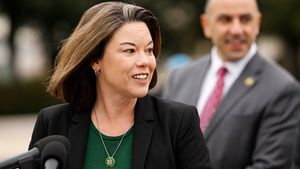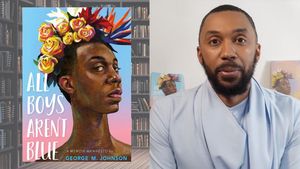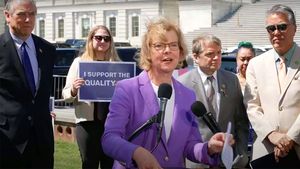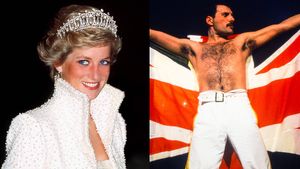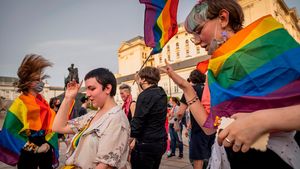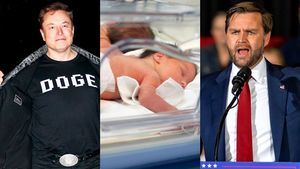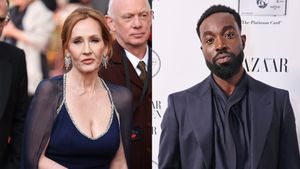 Photography by Kai Z Feng
Photography by Kai Z Feng
Styling by Grant Woolhead
When we last saw Lindsay Bluth Funke, she was rocked by a twin set of shocking truths: The spoiled only daughter of Lucille and George Sr. was not -- at least biologically -- one of the Orange County, Calif., Bluths after all. And somewhere in the sleight of hand that led to her secret adoption, three years had been subtracted from her age, which made her not 37 years old but 40.
If you've seen even a few minutes of Arrested Development, you can guess which of those revelations really rocked Lindsay's worldview. (The biggest upside of being adopted? She could finally pursue her brother Michael -- Jason Bateman -- romantically.)
Portia de Rossi played Lindsay for three seasons with a breezy, if bamboozled, charm, and as far as she or any of the show's ardent fans knew, that midlife crisis was her swan song. The series was summarily cancelled by FOX in 2006 after limping through a critically lauded but ratings-challenged run, and though rumors of a movie swirled for years, it became one of Hollywood's most poignant "when pigs fly" punchlines.
Enter Netflix, the on-demand DVD and video streaming service that's stepping slowly into the shoes of the major studios and networks and shaking up the way we consume TV. In 2011, the company ordered another season of the dry, demented comedy about a selfish brood of 1 percenters (when the show debuted a decade ago, Mitt Romney's dressage horse and car elevator, located just down the California coast from the fictional Bluths, was but a gleam in jokesters' eyes).
"It was a bit of a fantasy," de Rossi says of the show's second life, which during production grew from 10 episodes to 14, unbound by a strict broadcast 22-minute-episode schedule. "Because it's on Netflix, we didn't really feel the presence of a studio or a network. It felt like an independent feature, very creative and loose." Many days, she showed up without having seen a script: "We could trust the process because we know our characters and we know [creator] Mitch [Hurwitz]. But at the same time, everything was very spontaneous. Some of the funniest stuff I have ever seen in my whole life is in this new season."
Given another crack at Lindsay, de Rossi -- now 40 herself -- says she's discovered a surprisingly sympathetic side to the character: "In this reincarnation, she's doing a little work on herself. She is attempting to... not become a better person exactly, but to find out who she is and what she wants. She isn't as vapid and selfish as I've always thought her to be."
Where de Rossi is one-half of arguably the most famous gay couple in the world (her wife is Ellen DeGeneres), Lindsay is married to the most obvious -- if oblivious -- gay resident of the dysfunctional Arrested Development village. Tobias Funke (David Cross) is the butt of approximately 27-percent of the show's jokes, most of which center around his own megalomaniacal, grandiose attempts at self-improvement and success independent of his wife's family.

But the best recurring gag hints -- with the power of 1,000 anvils -- that Tobias is secretly living the life of an enthusiastically queer refugee from the 1990s. That it's a secret especially to Tobias is maybe the show's most artful dodge, and yet it somehow never strays into a homophobic portrayal. "I remember David Cross asking Mitch, 'Am I gay? Or is this just like this running joke?' " de Rossi says. "I can't imagine that he would ever think of himself as anything but this guy who is in an unfortunate marriage to a woman that doesn't really love him. I don't think that Tobias would ever think of himself as gay, and that's what makes it funny. It is a huge credit to the writing and to David [that it's not offensive]."
Since Arrested Development went off the air almost seven years ago, de Rossi, also an Ally McBeal alum, has done a stint on Ryan Murphy's Nip/Tuck (her first role in which she played gay), co-starred on the ABC sitcom Better Off Ted, and written a book about her struggle with an eating disorder (Unbearable Lightness).
"I've been very specific with my career," she says. "I really love acting, but it's important to me to be part of really interesting projects. Whatever I respond to, I really throw myself at. I like working with really smart people, and I like being on shows that are either challenging or say something about the culture that we all should be talking about or thinking about."
She has also plunged into producing, including a pilot she and DeGeneres worked on together about rival sisters. "I hadn't been on the ground floor of a project and put it together," she says. "I definitely am going to be developing more shows -- not only for myself -- in the future. I really liked being a part of the creative process from the beginning instead of just stepping into a role at the very end."
Perhaps because she's now had a taste of what more daring TV development can looklike with Netflix, de Rossi is particularly blunt about the much-heralded arrival (again) of funny women in TV. "Sometimes female voices are a little louder and sometimes they're not," she says. "But I think the general trend of network television is just money and how to make money. Until things actually change, the conversation sounds the same."

And her experience trying to produce gay stories for TV mirrors that gap between a powerful fantasy and the sometimes more uncomfortable reality. "I had a project that I was shopping around for TV called Butch and Fay, about two gay people, very famous actors who marry each other for the sake of their career," she says. "That happened a lot in the past and probably still exists today. Every single person that I brought it to was kind of titillated by the idea but ultimately shut it down, saying that being gay in the industry just wasn't an issue anymore. I know it's not very popular to bring this issue up, but it's still very difficult for actors to get certain types of roles. We need to hear it some more until things change."
The other half of the message that needs to be heard, she says, is pretty straightforward: "I really, honestly think that anybody who is openly gay and visible is powerful. It doesn't matter what you do, you are impacting people."
De Rossi's smart, articulate self-awareness took center stage during her graceful coming out in 2005 and her 2008 splashy-yet-intimate wedding to DeGeneres, which included a marriage equality media tour featuring the cover of People and a full-hour fete on the comfy perch of Oprah's couch. "We've settled into happily married life," de Rossi says. "We really support each other in whatever we're doing and we're incredibly happy, which is why you don't see us in the press so much. There's no drama to report."
But don't expect them to follow a more modern famous-family script. "There comes some pressure in your mid-30s, and you think, Am I going to have kids so I don't miss out on something that other people really seem to love? Or is it that I really genuinely want to do this with my whole heart? I didn't feel that my response was 'yes' to the latter. You have to really want to have kids, and neither of us did. So it's just going to be me and Ellen and no babies -- but we're the best of friends and married life is blissful, it really is. I've never been happier than I am right now."




 Photography by Kai Z Feng
Photography by Kai Z Feng




